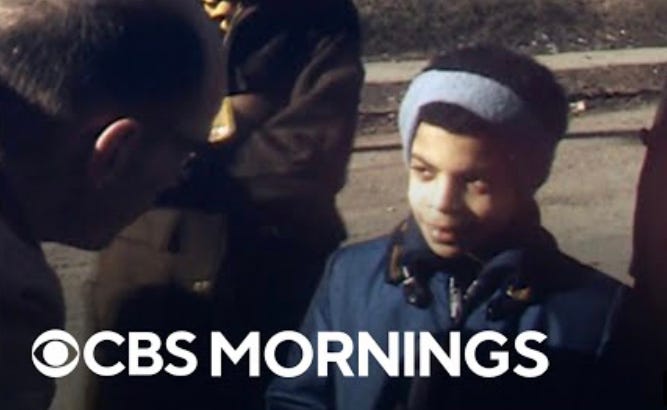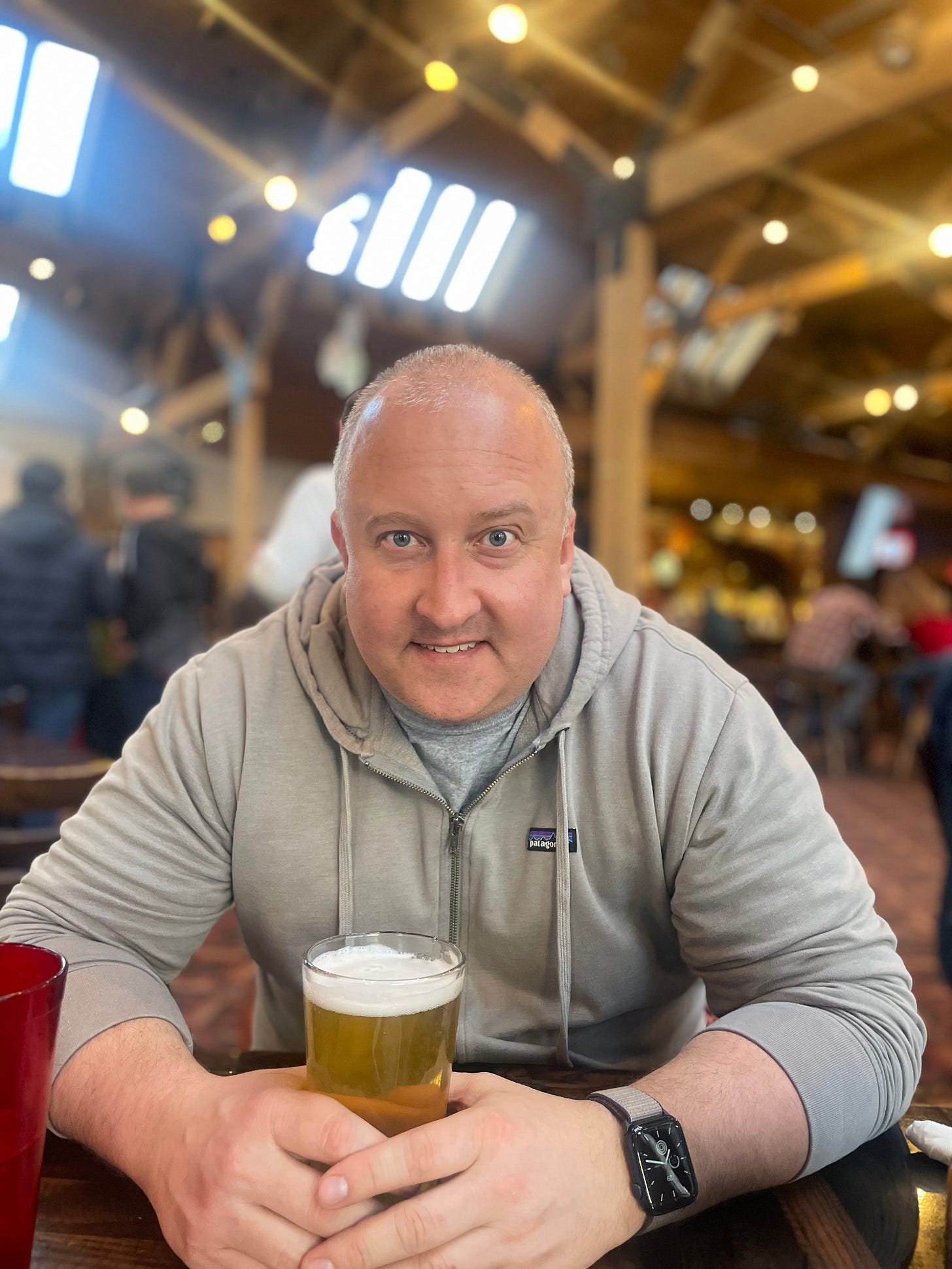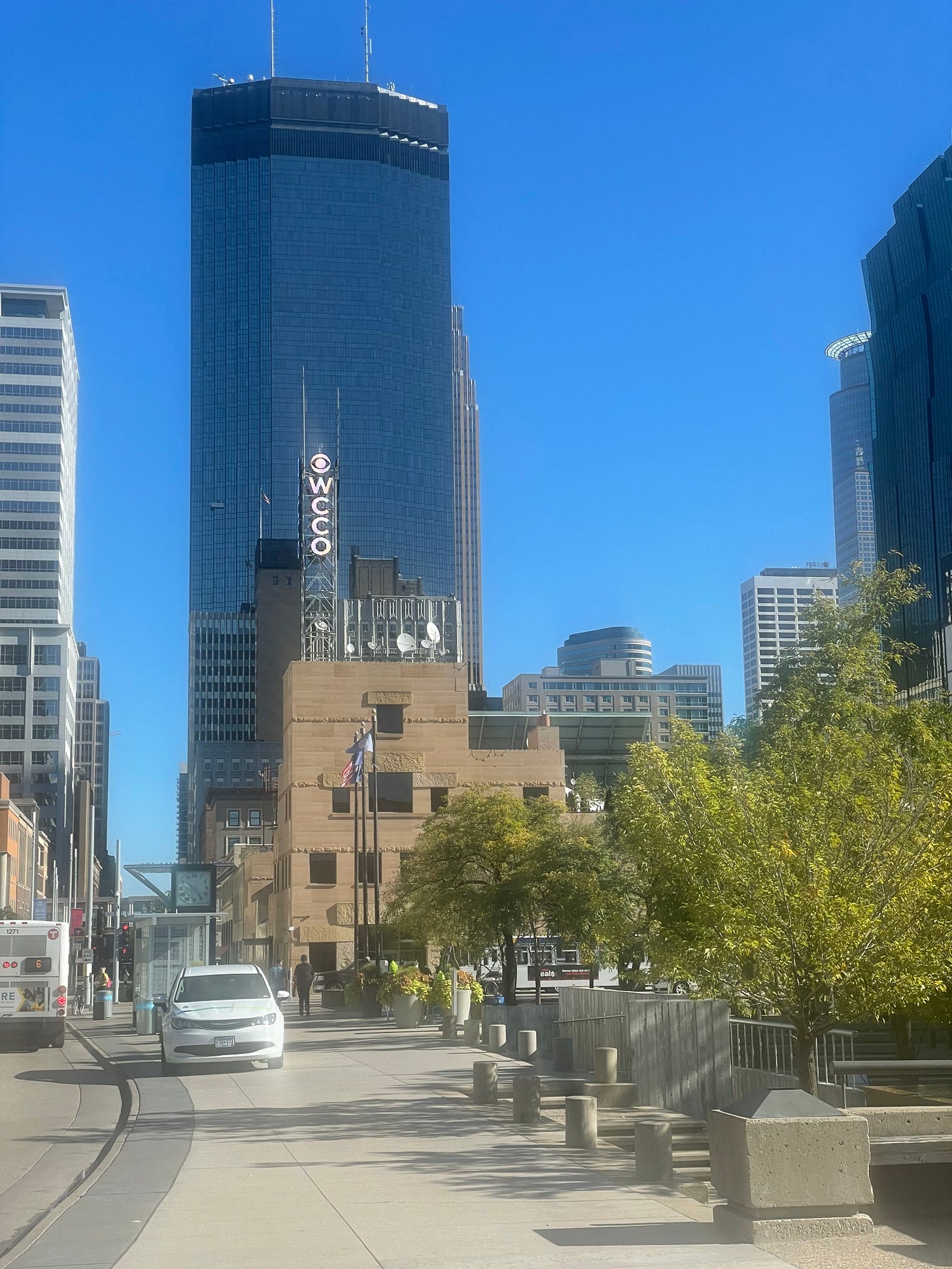Still Waiting (for Skipper)
Our Stargazing checklist: a preteen Prince courtesy of news journo Matt Liddy, the power of curiosity, and the hidden potential in everyone
“’Cause I’m so alone/And brokenhearted/It ain’t like my life is ended/But more like it never started.”
—Prince, “Still Waiting,” from his eponymous second LP
Stargazing—as I know it—should definitely stun you.
Yup, that’s the word.
Floor you. Leave you with Eyes. Wide. Open.
You’re gobsmacked and say to yourself, “Holy crap, that’s wonderful—” and then you dissolve into tears, memory, and well, song.
Then more tears, some laughter, more songs, and … I think you get the picture.
I felt many things when I saw the WCCO-TV spot on the 1970s Prince video: Wonder, awe, more curiosity, questions bubbling up—it was amazing.
Which, for me, is love.
On a personal note, our family first motored into Minnesota late winter of 1970-71, so the footage predates my being here, but I oddly felt a part of it. As Matthew Liddy, production manager at WCCO, the CBS affiliate in Minneapolis put it: “I don’t know why this is cool, but it is!”
I couldn’t agree more.
And it got me thinking about how curiosity has transformed my life, so I had to reach out to Matt to get his take on this and everything related to it.
We spoke on Saturday, April 9, 2022, and the interview that follows was edited for length and clarity.
Michael Maupin: Thanks for taking the time to chat, Matt. Did you have a lot of footage to go through on the teachers’ strike? That was your goal, but you found something else, right?
Matt Liddy: Absolutely. We ended up with something vastly different and much, much better, but it started really with ways to beef up our coverage of the current educator strike in Minneapolis, which was about to begin. This was late February. The assistant news director, Patrick Armijo, said we should check to see if we had footage from the 1970 teachers’ strike. He found out that, yes, we did have film, and then he asked to get some digitized so we could use it. It took about a week between trying to get a projector that could work to set it up in the basement of ’CCO to feed the film through the reel and get it digitized … we don’t usually take film and digitize it. In the 20 years I've been [at WCCO], including this film, we’ve probably gotten film three times. So there’s a hundred different things that had to happen for this to get out in the world right now, and one of them was just the oddity of us going that far back.
MM: Wow.
ML: I was not a part of that story. I was not gonna be writing it; I was not gonna be producing it, and I was definitely not the reporter for it. But I was just curious, you know, about what would be on the film. I wanted to see buildings I may have known because I grew up in Minneapolis. So I scrubbed through the video … I was killing a little time, I guess, and 11 minutes into the 13 minutes of film was when I saw Prince. If I had been taking a sip of coffee or if I had not been looking at the screen at that moment, who knows, because he was only on the screen for less than 30 seconds…
MM: Yeah.
ML: But when the camera zoomed in on him and he immediately looked familiar, I was, okay, that looks like Prince. I would pause it and see a few of the shots where it’s the side eye …and I’m like, “Man, that is exactly like an adult Prince.” I said, “I think this is Prince and it’s gonna be huge if it really is.” So we started the process of confirming.
MM: Curiosity comes, I think, when you’re looking at this from a completely relaxed state. You wanted to see these buildings in the 1970s and whatever, and curiosity tends to lead down diverging paths. Like you said, you could have been picking up a coffee cup—and missed that entirely. So you obviously followed the lead and then you guys knew you had to verify, right?
ML: Yeah. We definitely wanted to verify and we wanted to be careful with it. You know, I think one of the best parts about this is we were—as a team—very deliberate from the get-go … we didn’t want to just throw it out there. And that also led us to be fairly slow. It took us then from actually seeing it about five weeks before we put it on the air, because it—you know, it wasn’t super important. It’s very cool, but it’s not breaking news. And so we reached out to people who we thought might know people who grew up with Prince. We just kind of let it take its course and we weren’t getting any good answers. And when the curiosity turned into what you saw on television, [we had to ask ourselves] if we haven’t found anything at this point, what should we do to make this a story? Because we know it’s cool and now it’s gonna be a big deal. And so as a management team, we decided what we’re gonna do is give the story to reporter Jeff Wagner and photographer Joe Berglove, and the story will be their process. The story will be the process of trying to confirm that it’s him.
MM: Wonderful.
ML: And yet, if we don’t get anything, if they find out—if they don’t know who it is, that’s the story, and we’ll still put it out there and then we’ll feel at least good that we did our due diligence as a news organization. …What ended up happening was just a remarkable story of discovery, you know. And my initial discovery followed by a historian who became emotional looking at it followed by the best part, which was Terrance Jackson, who, you know, grew up with Prince and played in his first band, and immediately said, “That’s Skipper!” [Prince’s childhood nickname] and even [identified] the other kids in the video. That journey doing the story made it so much better than it would’ve been initially had we just said, “Look at this cool 20-second clip … what do you think?”
MM: Yeah, Matt, that was the core—what your reporter and photographer came up with in that Terrance Jackson interview.
ML: Yeah.
MM: It translates to the audience as emotion. For a lot of people, I think what moved us is, yes, that is somebody we recognize. And if we’re looking into our own pasts and we get curious about our own upbringing and how we became who we are or could be, then it really did matter because the audience says to themselves, “God, there are probably early videos of me! What would I have said? What did I hope to become?” And here, we’re looking at Prince still waiting to write his song “Still Waiting” nine years later. It’s amazing. It’s almost a miracle. …but I think it’s a miracle that’s open to a lot of people, something that I think we can include in our own lives.
So, how do you define curiosity, personally or in your career? When you run into people who are incurious or have a disinclination to investigate things, why do you suppose we do that, or what have you done in the past to improve on that?
ML: For me, curiosity is really caring about what’s going on around you in the world. It can be really about anything, you know. It just so happens that I’m very curious about music and music history and how songs came to be, where they were recorded and how they were recorded, and those kind of things. So I have a passion for music history, but other people might have a passion for art history or literature or anything like that. And it starts with just wondering about, and wanting to know, the process and wanting to know how things work. Obviously, as a journalist who’s worked in news for 20 years, that’s kind of a perfect job for a curious mind. If everyone’s curious, the world [would] be a better place.
I’ve always been someone who liked to read the newspaper every morning and get as much information about what’s going on in the world as I could. Sometimes we get lazy and—I don’t know if lazy is the right word, nonchalant might be the right word—I don’t necessarily need to weigh my mind down with a burden of these other 10 things, you know, so I’m not gonna be curious about that, I’m just gonna let other people be curious about that. So I do think there’s a value and you don’t have to know everything.
MM: Yeah.
ML: But when you identify something in your life that you’re passionate about, that you really like, and then really follow it up, you know, [ask yourself] “Why is it that I love this song? Why is it that I love this book? Why is it that this movie touches me?” And I think the way—at least the way my mind works, I get much more out of trying to decipher that than I might actually get out of a piece of art itself, you know? So if I’m listening to a song, I know that the song was recorded here and that the musicians were doing this and that they stopped 10 times because so-and-so was laughing or—you know, I love that kind of stuff.
MM: Prior to finding this, did you ever have a similar find? Did you have something that kinda left you, “Oh, man, this is great!” I’m just curious if you had anything comparable to this Prince experience.
ML: Well, I haven’t had anything, you know, like this, and I don’t think I will. [laughs] It’s such a unique, insane stroke of luck that I really don’t think that will ever happen to me again, and it definitely did not happen to me before. But of course, you stumble across things, looking at old pictures—even, you know, silly Facebook memories that pop up [from] 10 years ago now are cool to see. It brings you back to a place which I think, as you talked about this a little bit earlier, is for those of us who grew up without social media, you know, if we saw ourselves talking to a reporter, it would be fascinating because “our best friend’s talking to the kids we grew up with talking to a reporter.” [But] it’s fascinating to see what you looked like or what anybody looked like 30 years ago, 40 years ago, 50 years ago, whatever it is, and to think what that person then turned into, whether it’s Prince or whether it’s you—that, to me, is fascinating. And you can get that in any photo album that you own, you know, just start looking at that and go back and try and place where the picture was and what you were doing and what you were thinking and what your parents were thinking and what they were like at that time, those kind of things. Everybody has the chance of walking that path of discovery from the past, and that’s why history is so cool and why I think this video is so cool and much, much more than the 17 seconds that [Prince is] talking.
MM: Yeah. I’m gonna wrap it up with something that we both were moved by: Zaheer Ali’s take in the New York Times: “That little boy is standing there and maybe thinking this is the most famous he would ever be talking to that reporter and think about all the potential he had bottled up inside of him…”
ML: —Yeah. Gives me chills.
MM: …it gives you the chills.
ML: That one gives me chills.
MM: When I saw the Prince clip, it seemed marvelously eerie—supernatural even—something I suspect that Prince himself would’ve loved. Like he had made this decisive reappearance; it was so Prince-like: “Hey, check me out! I’m 11 years old!” Did you get a feeling similar to that, or—
ML: —I really did! It is so strange that it’s Prince, since Prince and I share a birthday, we’re both born on June 7, like, there was some weird stuff going on here. And, yeah, how do all [these] things happen: that I find this video, that the video exists in the first place, that we recognize who he is and we do the work and then throw it out there. I typically do not, you know, believe in supernatural-type things, but I was talking to my friend the other night about it, I was like “there is something more going on here,” and at least I feel it.
That Zaheer Ali quote is the crux of the whole thing for me. It’s every kid, every person has something inside that we don’t know what it is at that point, and, you know? What was in his head at that time? Was his favorite color purple at that point? What did he listen to when he went home that night? What kind of music was he listening to that week? You know, it’s just remarkable to think that [Prince], just like Ali said—he probably went home and told his mom he was interviewed and he might be on the news tonight. And that’s the coolest thing that’s happened to him at that point. And seven years later, he’s an international superstar, it’s for eight years—you know, it’s crazy.
MM: Yeah, yeah. He’s still waiting—
ML: —I still am.
MM: I think maybe we’re all still waiting. But I want to thank you, Matt. This is a marvelous story. Our take here is less about fame and more about potential.
ML: Yeah.
MM: Hopefully it inspires people to get into their own archives, see what they’ve got down there, and pull something up because they just might find a gem.
ML: Absolutely, one hundred percent. So appreciate talking to you; it’s been really fun.





Amazing interview Michael. Discovering that clip was the highlight of my year. I immediately burst into tears when I saw it for the exact reasons pointed out in this discussion. It was a tiny gift from the beyond.
In 2013, a year after my mother died, while I was still wading through boxes of photos, paperwork and correspondence, I brought our home movies to the Chicago Film Archives to be digitized. And I had a similar “Prince-like” reaction to a movie of my dad as a very young man. There were the familiar mannerisms that brought him back to life (so full of life!) for a few moments. And I thought about how much he had yet to experience. It was exquisitely heartbreaking. Here is a link to the clip. Not sure if it works but if you can see it, my father is the young man with the brown hair.
https://m.youtube.com/watch?v=UFRu3dgImW8